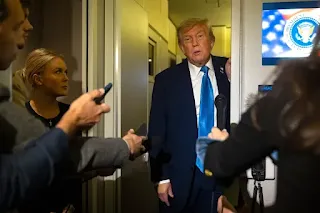Trump added in a post on the Truth Social platform: "We know exactly where the so-called 'Supreme Leader' is hiding. He's an easy target, but he's safe there. We won't kill him! At least not right now."
"But we don't want to launch rockets at civilians or American soldiers. Our patience is running out," he continued, before posting a message that read: "Unconditional surrender!"
In a related development, Trump said Tuesday that Iran is very close to developing a nuclear weapon, denying claims by US Director of National Intelligence Tulsi Gabbard that Iran has not developed nuclear weapons.
In response to a reporter's question aboard Air Force One about how close Iran was to possessing a nuclear weapon, Trump said Tehran was "very close."
In response to reporters who addressed a speech Gabbard had previously given to Congress, in which she stated that "Iran had not built a nuclear weapon," Trump said, "I don't care what she said. In my opinion, they were very close to building one."
Speaking before Congress last March, Gabbard said that intelligence assessments indicate that Iran has not developed a nuclear weapon, and that the country's Supreme Leader, Ali Khamenei, has not approved the nuclear weapons program, which has been suspended since 2003.
She added, "US intelligence is closely monitoring the situation to determine whether Tehran will decide to resume its military nuclear program."
regime change
Meanwhile, the American website Axios revealed that President Trump was not convinced by Israeli Prime Minister Benjamin Netanyahu's idea of regime change in Iran.
Axios quoted a US official as confirming that Trump was not convinced by the talk of regime change in Tehran after Netanyahu's June 16 remarks, in which he said, "We will do what is necessary," in reference to the assassination of Iranian Supreme Leader Ali Khamenei.
The US official summarized the current US approach as "like choosing between a known Ayatollah and an unknown Ayatollah," and said there was still the possibility that Trump would carry out "a sudden, large-scale move."
The official, whose name was not mentioned by the website, stressed that Israel is more interested in regime change in Iran than the United States.
The website noted, citing Israeli officials, that a potential regime change in Iran "is not an official goal of the war."
On Monday, Netanyahu claimed that assassinating Iranian Supreme Leader Ali Khamenei would end the conflict between Tel Aviv and Tehran. When asked whether Israel would actually target Khamenei, he said that Tel Aviv "is doing what it has to do, and I won't go into details."
Since Friday dawn, Israel, with US support, has launched an aggression against Iran, bombing nuclear facilities and missile bases, and assassinating military leaders and nuclear scientists. This has left 224 dead and 1,277 wounded. Tehran has responded with ballistic missiles and drones, leaving approximately 24 dead and hundreds wounded.
Tel Aviv and Tehran consider each other their arch-enemies, and Israel's current aggression against Iran is the most extensive of its kind, representing a transition from a "shadow war" of bombings and assassinations to an open military conflict.





